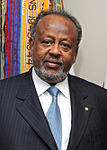| ||||||||||||||||||||||||||||
All 65 seats in the National Assembly 33 seats needed for a majority | ||||||||||||||||||||||||||||
|---|---|---|---|---|---|---|---|---|---|---|---|---|---|---|---|---|---|---|---|---|---|---|---|---|---|---|---|---|
| Registered | 178,799 | |||||||||||||||||||||||||||
| Turnout | 47.84% ( | |||||||||||||||||||||||||||
| ||||||||||||||||||||||||||||
 Results by region | ||||||||||||||||||||||||||||
| ||||||||||||||||||||||||||||
 |
|---|
| |
Parliamentary elections were held in Djibouti on 10 January 2003 to elect the National Assembly of Djibouti. The ruling coalition of President Ismail Omar Guelleh won all 65 seats in the election, defeating an opposition coalition.
Contents
The elections were the first in which women were elected to parliament after a new law was passed requiring a minimum of 10% male or female candidates in candidate lists. [1] [2]

